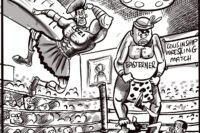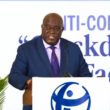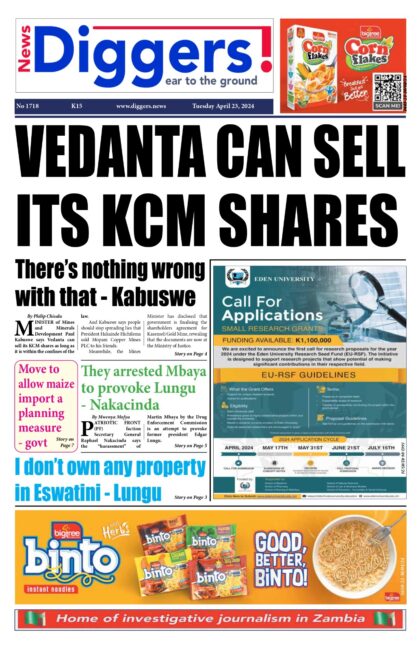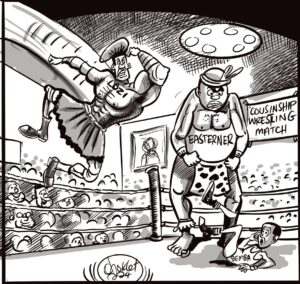Transparency International Zambia president Rueben Lifuka says Chief Government Spokesperson Dora Siliya’s arrogance over the US government’s Millennium Challenge Corporation (MCC) fiscal year 2020 scorecard is a source of concern that the PF government did not carefully study it before making a public statement.
Responding to a press query, Monday, Lifuka noted that Zambia’s FY2020 scorecard on control of corruption was actually the worst in the last 4-5 years.
He recalled that when President Edgar Lungu took office in 2016, the scorecard for Zambia was 87% but the scorecard was now 71%.
“On 1 November 2019, the U.S. Government’s Millennium Challenge Corporation (MCC) released its fiscal year 2020 country scorecards, which are essentially a collection of 20 independent, third-party indicators that measure a country’s policy performance in the areas of economic freedom, ruling justly and investing in its people. The Zambian government has enthusiastically welcomed the country score specifically on the “Control of Corruption” indicator, which falls under the Ruling Justly category. The Chief Government Spokesperson and Minister of Information and Broadcasting- Hon Dora Siliya, has expressed her government’s appreciation of the FY2020 score on control of corruption and essentially characterised this as a recognition by the US government of the Zambian government’s efforts in combating corruption. In Parliament during the debate on the budget for the Anti Corruption Commission, Hon Siliya enthused this scorecard for Zambia and underscored that “numbers do not lie” and essentially pronounced that Zambia was on the right trajectory in fighting corruption,” Lifuka stated.
“As Transparency International Zambia, we want to state from the onset that it is our desire to see Zambia become corruption free and therefore, we look forward to a day when indeed, all corruption metrics will be positive for the country. However, in the case of the MCC FY2020 scorecard for Zambia and specifically on the control of corruption, we find the self assured hubris expressed by the Chief Government Spokesperson, misplaced and probably a cause for concern that the PF government did not take time to carefully study the FY2020 Score card before making a public statement on this. It is for this reason that we wish to provide some contextual background to the scorecard.”
He explained how the scorecards were generated.
“1. The Millennium Challenge Corporation for the Fiscal Year 2020, continued to use the historical ceiling for eligibility as set by the World Bank’s International Development Association (IDA) to divide the 77 countries into two income groups for the purpose of comparative analysis on the policy performance indicators. These two income groups include: 1) countries whose Gross National Income (GNI) per capita is under or equal to $1,925 in FY2020 and 2) those countries whose GNI per capita falls between $1,926 and $3,995 in FY2020. Zambia falls in the group whose GNI per capita is less than or equal to $1,925. For FY2020, there were 49 countries in this group which are considered as MCC candidates and these include Afghanistan, Bangladesh, Cambodia, Cameroon, Eriteria, Haiti, Kenya, Rwanda, Malawi, South Sudan, Somalia, Zimbabwe and Syria, among others. Under the policy category of “Ruling Justly”, MCC has indicators to measure just and democratic governance, including a country’s demonstrated commitment to promoting political pluralism, equality, and the rule of law; respecting human and civil rights; protecting private property rights; encouraging transparency and accountability of government; and combating corruption. Specifically on Control of Corruption, this is an index of surveys and expert assessments that rate countries on: “grand corruption” in the political arena; the frequency of petty corruption; the effects of corruption on the business environment; and the tendency of elites to engage in “state capture,” among other things. The source of information for control of corruption is the World Bank/Brookings Institution’s Worldwide Governance indicators,” Lifuka stated.
“It is important to note that the Worldwide Governance Indicators are aggregate indicators that combine the views of a large number of enterprise, citizen and expert survey respondents in industrial and developing countries. They are based on over 30 individual data sources produced by a variety of survey institutes, think tanks, non-governmental organizations, international organizations, and private sector firms, including Transparency International, through its Corruption Perception Index (CPI). To judge performance on policy indicators and specifically on control of corruption, MCC considers whether a country performs above the median on the Control of Corruption indicator. Therefore, as TI Zambia, we do note that the “good news” is that on the Control of Corruption, Zambia had a country score of 0.20 which is above the median of 0.00 and the country’s percentile ranking among the 49 countries in the income group of less than or equal to $1,926, was 71%. The country passed on this indicator and probably this is what the Hon Minister of Information and Broadcasting Services together with her government colleagues have been celebrating. Yes, it is good that Zambia has not fallen below the median but this is where the good news ends.”
He said, therefore, that according to a historical analysis of the numbers, Zambia had performed the worst in the last 4-5 years.
“To use Hon Siliya’s words, numbers do not lie, the truth of the matter is that the FY2020 scorecard on control of corruption, is the worst that this country has had in the last 4-5 years. For FY2020, Zambia has dropped from a percentile ranking of 82% in FY2019 to 71%- this is the biggest drop in ranking bearing in mind that a country with a ranking of 0% is considered to the worst in terms of control of corruption and one scoring 100% is the best ranked. Zambia has been dropping in its ranking over the last four years. In 2016, when President Lungu took office, the scorecard for Zambia was 87%, with a country score of 0.45 above the median. In 2017, Zambia was ranked at 85% with a country score of 0.41, and in 2018, the ranking was 84% and a country score of 0.41. Rwanda on the other hand had a 100% ranking in FY2020 for control of corruption, Sao Tome and Principe- 98%, Senegal -96% and Tanzania at 88%. This steady decline, not only on the MCC Country performance scorecard, but other governance metrics, should be a source of concern to government. Evidently, there are drivers of this decline which need to be addressed and put to a stop. Collectively, we should be ashamed to be ranked or considered as a corrupt country- there is no national pride to be taken in this corruption tag and all should be done to rid this country of corruption,” he stated.
Lifuka said worsening corruption had to be stopped before it overwhelmed all sectors of the country.
“Our advice to government is take time and thoroughly analyse the different corruption or governance metrics which are pointing to a worrying downward trend in the control of corruption. This slide has to be stopped before corruption overwhelms all sectors of the country and paralyses us from moving forward as a nation. Cabinet should take a leading role in not only understanding the importance of such scorecards but in devising strategies for addressing corruption. We need concerted efforts in dealing with corruption and these efforts should go beyond mere rhetoric or inconsequential pedestrian actions. We need commitment from all stakeholders including the private sector in addressing this scourge,” stated Lifuka.
“Most importantly, Government should stop being defensive when confronted with allegations of corruption but should urgently seek solutions to the problems identified. Our public leaders need to be role models in the fight against corruption and should not give themselves a thin veneer of comfort that corruption is a universal problem as we have so often heard. One of the reasons why we are failing in the fight against corruption is that government continues to send mixed signals on their commitment to do the right things. We want to see a blueprint from Government, on how it intends to tackle the various forms of corruption and particularly, grand corruption, political corruption and state capture. The authenticity of government in this fight against corruption, will not be seen by the eloquent words spoken, but by the pragmatism of the actions taken.”













One Response
Zambia is a Christian Nation, therefore, accountable to god alone, and that is why it is going ahead with Bill 10 to make sure that there are no systems of have oversight over what the god chosen leaders as confirmed by various men/women of god do with national resources and governance. Moreover, the cited report is a product of human hands, Zambia follows the bible and where do you find statistics in the bible. This is why MNGRA is making sure that Muslims, Hindus and Sikhs have their rights enjoyed at the discretion of christians who have no problems to be associated with corruption and bad governance